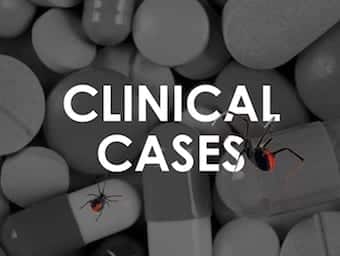
Citalopram overdose
26 year-old female who claims to have ingested 40 x citalopram hydrobromide tablets (40mg each) about 3 hours ago - what do you do next?

26 year-old female who claims to have ingested 40 x citalopram hydrobromide tablets (40mg each) about 3 hours ago - what do you do next?

A 40 year-old man presents to the 'fast-track' area of your emergency department. He has a ulcerating sore on his right arm. He says its been getting worse over the past 2 weeks.

A 34 year-old female with a past medical history of Hashimoto's thyroiditis (currently taking thyroxine 200 mcg daily) who took an overdose of 60 x 200 mcg thyroxine 6 hours ago

A 25 year-old woman with a history of depression was found by her flatmate. An empty 200mL bottle of chloral hydrate was present at the scene. She arrived at your emergency department with the following vital signs...

A 70 year-old man has presented to your emergency department to get his INR checked. It is markedly elevated - how should you manage this?

A 25 year-old male (70 kg) is brought in by ambulance 30 to 60 minutes after ingesting 70 x 50mg amitriptyline. He is tachycardic (HR 120) with an otherwise 'normal' ECG (QRS 95 ms) but is becoming drowsy. You are called to the resuscitation room to assess him.

Administration of intravenous calcium has traditionally been considered a contra-indication for the treatment of hyperkalemia in the presence of digoxin toxicity. This is based on the ‘Stone Heart’ Theory: calcium may lead to an irreversible non-contractile state, due to impaired diastolic relaxation from calcium-troponin C binding

Outline the key issues in the management of acute right ventricular failure in an ICU patient with moderate to severe pulmonary hypertension.

Funtabulously Frivolous Friday Five 118 - Just when you thought your brain could unwind on a Friday, some medical trivia FFFF.

It's Friday. Boggle your brain with FFFF challenge and some old fashioned trivia. Funtabulously Frivolous Friday Five 267

Ludwig angina: rapidly progressive gangrenous bilateral cellulitis of the submandibular space with risk of life-threatening airway compromise

The CT head scan is a computer-generated series of images from multiple X-rays taken at different levels. Fine X-ray beams passed through the subject are absorbed to different degrees by different tissues and the transmitted radiation is measured by a scanning device.